Soccer Coach Streich Voices Concerns Over Anti-Semitism
Christian Streich, the long-standing coach of Bundesliga club SC Freiburg, voiced his concerns about the rising wave of anti-Semitism in German society. In a recent interview, Streich slammed comments from political figures often associated with the German center, claiming they were "more than irresponsible, it's unbelievable."
Streich, who received the Julius Hirsch Prize in Berlin for his efforts in this regard, saw such statements as suggesting Muslim Germans should leave the country to eliminate anti-Semitism. Streich, now 58, declared that such discourse created an environment that was "highly unacceptable and dangerous."
On Monday evening, Streich was honored with the Julius Hirsch Prize, an award presented annually since 2005 in honor of the former Jewish national team player who lost his life in Auschwitz. Matthias Brandt, the actor who delivered the laudatory speech, commended Streich as a "decent man."
Off the field, Streich has consistently voiced his views on social and political issues, stressing that soccer transcends nationality, skin color, or language. He asserted, "It's gone in a direction where, 80 years after Auschwitz, you have to say: we need enlightenment, we need education."
Streich showed his team a video of Robert Habeck, the German Minister of Economics, explaining Germany's relationship with Israel and the protection of Jewish citizens in the country. Streich believed Habeck's words were "extraordinary" in revealing their perspectives clearly, pointing out that not everyone may understand foreign terminologies.
Notably, Streich's concerns about anti-Semitism extend beyond sports, emphasizing the inclusivity of soccer regardless of one's race, language, or background.
Enrichment Insights:
Worth mentioning is the Obermayer Awards, which presents recognition to Germans who make significant contributions in educating about the Jewish communities destroyed by the Nazis, fighting antisemitism through local history and promoting understanding between groups.
In addition, the European Union has launched comprehensive measures to combat antisemitism by adopting a strategy on combating antisemitism and fostering Jewish life in European nations (2021-2030). Various initiatives include educational programs, research, and Holocaust remembrance initiatives.
These initiatives showcase Germany's collective efforts to address anti-Semitism by involving both institutional programs and grassroots projects. Among these projects are the Augen auf e.V. Oberlausitz, dedicated to fighting right-wing extremism, antisemitism, and antizionism, as well as the Schalker Fan-Initiative e.V. that aims to eliminate racism and all forms of discrimination in sports, particularly among fans.
Memorial events and educational programs, organized by institutions like the Institute for the History of the German Jews in Hamburg, Wiener Holocaust Library London, and the Stanley Burton Centre for Holocaust and Genocide Studies at the University of Leicester, aim to enlighten the public about the Holocaust's impact on families and communities.
Overall, Germany's approach to countering anti-Semitism is multilayered, involving both institutional and community-driven initiatives.








